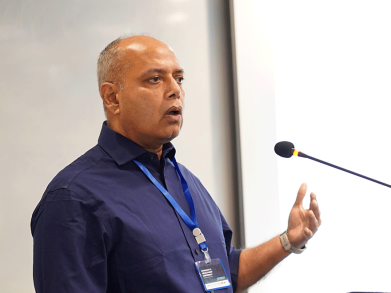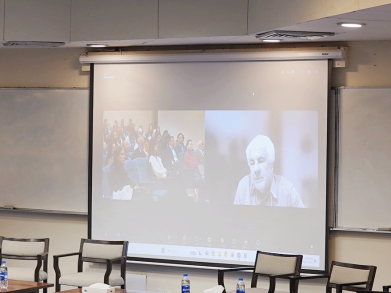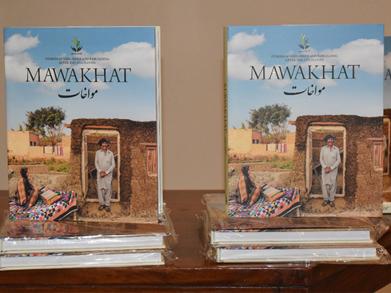
November 7, 2025
The Gurmani Centre for Languages and Literature invites you to a literary session titled Maqamī Insan ke Mutanavve’ Rang (مقامی انسان کے متنوّع رنگ): Literary Voices from the Margin.
This session brings together three contemporary writers from Pakistan’s peripheral regions whose creative works reimagine language and locality as dynamic spaces of meaning. Challenging the hegemony of the centre, their writings reveal how voices from the margins reshape and reimagine Pakistan’s literary and intellectual landscape.
The discussion will feature three significant literary works that collectively unsettle the hegemony of the centre and foreground the plurality and depth of Pakistan’s diverse literary traditions. Riffat Abbas’s Mashkharēyāṅ dā Mēlā, a Saraiki novel, explores the complex social and emotional landscapes of working-class life. Set among craftsmen, labourers, and everyday people, the novel uncovers dignity, humour, and wisdom within struggle. Through rich linguistic texture and poetic realism, Abbas portrays a community negotiating between tradition and modernity, poverty and pride, despair and resilience. Moving southward to Sindh, Khaleel Khumbar’s Ab Achūt Bolē Gā offers a powerful Sindhi narrative from Tharparkar that delves into the intertwined politics of language and identity, giving voice to those long silenced by social hierarchies. It reveals how speech and silence themselves become instruments of belonging, marginality, and resistance within Sindh’s cultural and social fabric. Finally, Ashu Lal’s Abnārmal, translated into Urdu from Saraiki by Munir Ghani Sheikh, presents a collection of short stories where philosophical reflection meets poetic intensity. Through his characters and narrative vision, Ashu Lal interrogates ideas of normality, alienation, and truth, making fiction a site that contests the imposed hierarchies of centre and periphery. The session will be moderated by Dr. Muhammad Naeem Virk.
Together, these works illuminate the plurality of the human experience — each written in a language that speaks from and for its people.
Moderator:
Dr. Muhammad Naeem Virk teaches at the University of the Punjab, Lahore; he also serves as the Coordinator of the MPhil Urdu programme and the editor of the research journals Bāzyāft and Tahqīq. His areas of academic interest include Urdu fiction, social theory, cultural studies, and postcolonialism, and he approaches literature as a form of cultural activity. Currently, he is engaged in reinterpreting modern Urdu literature through the lens of spatial criticism. He has authored five scholarly books to date, including Urdu Novel aur Istama’ārīyat (2017), Urdu Novel ka Saqāfati Mutāla‘a (2019), and Urdu Novel: Kalāmiyah aur Istama’rī Tamīriyat (2025) in the category of research; Nobel Khutbāt: Ma‘āshiyāt (2018) in translation; and Surat-e-Hāl by Shad Azimabadi (2022) as an edited work.
About the Speakers:
Riffat Abbas is a distinguished Saraiki poet and critic. Although he teaches Urdu language and literature, his creative and intellectual expression belongs to the Saraiki language. His book Maqāmī Aadmī kā Mo’qaf reflects his commitment to exploring comparative aesthetics and the intellectual foundations of thought in indigenous languages. He has published ten collections of poetry, which include Paṛchiyāṅ Utē Phul, Sangat-o-Bad, Ishq Allah Sāyeeṅ Jagāyā, and Ieṅ Nārangī Andar. His novel Loon Da Jeewan Ghar has also been widely acclaimed. Abbas has translated many renowned works into Saraiki, and for his literary contributions, the Government of Pakistan awarded him the Tamgha-e-Imtiaz. In addition, his poetry collection Ishq Allah Sāyeeṅ Jagāyā received the Khawaja Ghulam Farid Award in 2006.
Khaleel Khumbar is a Sindhi poet and columnist. He has written for some of Sindh’s leading newspapers, including Kawish and Panhinji Akhbar. His published works include a Sindhi poetry collection ڀڳي هڏ جيئن ڏکان آئون and a compilation of his Sindhi columns titled هان اچھوت گالھائیندو, later translated into Urdu as Ab Achūt Bolē Gā (Aks Publications, Lahore). His Sindhi poetry has also been translated into Saraiki by Riffat Abbas under the title جینویں ترٹیا ہڈ ڈکھے. Khumbar has been an active voice for social and environmental justice in Tharparkar, advocating for the preservation of the Karoonjhar hills and the protection of local wildlife. His writings strive to see and represent the world through the eyes of the marginalised — particularly the Achhoots and Shudras. Widely recognised across Pakistan, he stands as both a poet and a committed social activist of Sindh.
Ashu Lal Faqeer is a renowned Pakistani poet writing in the Saraiki language, hailing from Karor Lal Esan. Trained as a medical doctor, he earned his MBBS from Quaid-e-Azam Medical College, Bahawalpur, but chose poetry as his true calling. His work reflects a deep engagement with human experience, philosophy, and the spiritual landscape of South Punjab. Among his celebrated poetry collections are Chairroo Hath Nah Murli (The Shepherd without a Flute), Gautam Naal Jhairra (Arguments with Gautam, 1995), Kaaṅ Wassu dā Pakhī Aey (Crow is the Bird of Human Abode, 1997), Sindh Sāgar Nāl Hamesha (Always with River Sindh, 2002), and Jaal Maloti (A Meeting Place). In addition to poetry, he has published two short-story collections titled Abnormal and Bairrī (Boat).
Munir Ghani Sheikh is the translator of Ashu Lal’s short story collection, Abnārmal, and hails from Karor Lal Esan, the writer’s hometown. With a master’s degree in Urdu Literature, he is also the president of Chaupal Adabī Saqāfati Forum, a leading literary and cultural organisation in South Punjab. His long association with Ashu Lal has involved assisting in the publication of the author’s major works, giving him deep insight into Ashu Lal’s literary thought and vision.
Join us for an evening celebrating the many hues of Pakistan’s literary landscape and the vibrant creative energies emerging from its peripheries.


















